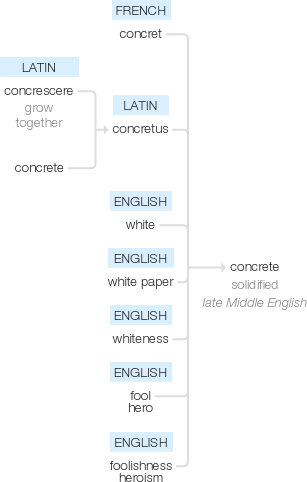Concrete
late Middle English (in the sense ‘solidified’): from French concret or Latin concretus, past participle of concrescere ‘grow together’. Early use was also as a grammatical term designating a quality belonging to a substance (usually expressed by an adjective such as white in white paper ) as opposed to the quality itself (expressed by an abstract noun such as whiteness ); later concrete came to be used to refer to nouns embodying attributes (e.g. fool, hero ), as opposed to the attributes themselves (e.g. foolishness, heroism ), and this is the basis of the modern use as the opposite of ‘abstract’. The noun sense ‘building material’ dates from the mid 19th century.
wiktionary
From Latin concrētus, past participle of concrescō ( com- + crescō).
etymonline
concrete (adj.)
late 14c., "actual, solid; particular, individual; denoting a substance," from Latin concretus "condensed, hardened, stiff, curdled, congealed, clotted," figuratively "thick; dim," literally "grown together;" past participle of concrescere "to grow together," from assimilated form of com "together" (see con-) + crescere "to grow" (from PIE root *ker- (2) "to grow").
A logicians' term (opposed to abstract) until meaning began to expand 1600s (see concrete (n.)). Concrete poetry (1958), which depends much on the form or shape of its printing, is translated from terms coined independently in mid-1950s in Brazil (poesia concreta) and Germany (die konkrete Dichtung).
concrete (n.)
1520s, "that which is material or not abstract," a noun use of concrete (adj.). Meaning "a mass formed by concretion" is from 1650s, from the literal sense of Latin concretus. Hence "building material made from sand, gravel, stone chips, etc., cemented together" (1834).
